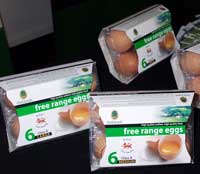



How a Lion Saved the UK Egg Industry
The annual meeting of the British Free Range Egg Producers Association (BFREPA) at Stoneleigh at the end of November was attended by up to 500 participants - a record number, writes Jackie Linden, editor of ThePoultry Site.
Despite global economic problems, there was a distinctly upbeat atmosphere at this year's BFREPA Annual Meeting, which chairman, Tom Vesey, opened under the banner, 'Food for the Future'.
Between the official conference presentations were clips of video interviews with the British public talking about eggs. The clear message was that UK consumers enjoy eggs and the majority choose those produced on free-range farms. The reason they gave for choosing free-range eggs over those from caged hens were equally divided between those who first mentioned better welfare, and those who prefer the taste of a free-range egg. The audience was assured that no comments against free-range had been been left on the cutting room floor!
Summing up the current mood of the industry, conference moderator, Beverley Ashworth identified the main concerns for the future of the industry as the unprecedented economic situation, regulations to reduce stocking densities, the impending EU ban on conventional cages in 2012 and how retailers will react in the longer term. She mentioned that there had been a significant switch in demand away from organic eggs towards free-range during the last year.

Richard Geldard, a free-range egg producers from Cumbria in north-west England, explained how he has continued to build up his family's egg business from 100 pullets to the present 44,000 hens kept in five flocks.
He felt his success had come from being dedicated to free-range production, as well as from focussing on the growing demand for locally produced food. Consistently high product quality is also key, combined with excellent welfare standards, he said. The farm belongs to the Freedom Food scheme set up by the Royal Society for the Prevention of Cruelty to Animals (RSPCA).
"Good public perception leads to good industry opportunities," concluded Mr Geldard.

Also speaking at the conference was Peter Kendall, president of the National Farmers Union of England and Wales (NFU). He focussed particularly on the need for food security in the country, which has now been been recognised by the government and particularly by Prime Minister, Gordon Brown.
Mr Kendall identified a number of positive developments in the egg industry, particularly the major push towards free-range production and some retailers pledging free-range policies following high-profile campaign by TV celebrity chefs. He also mentioned the continued strength of demand despite the credit crunch and plenty of opportunities to expand.
Future challenges for the industry include the likely decline in consumer income and the availability of credit may become even tighter, he said. Furthermore, competition will increase as producers opt to move out of cages as the 2012 deadline approaches.
Mr Kendall concluded that the future success of the industry lies in in maintaining quality assurance and in branding. "Free-range producers are well placed to manage change," he said.
A Friendly Lion Rescues the Industry

Even ten years later, Ms Cryer explained, eggs still had a bad reputation and the decline in consumption, which had started in the 1960s, began to look irreversible.
She said, "The future started in November 1998." A survey had revealed that consumers were still worried about the health aspects of eating eggs, and convenience foods were seen as more exciting. Most concerning was that a key consumer group - mothers of young children - had greatly cut their purchases of eggs.
"People wanted reassurance and inspiration," said Ms Cryer, explaining the reasons to re-launch of Lion Quality eggs.

Photo: BEIS
The Lion had been a popular and well recognised mark since the 1960s but the re-launch included one significant change: all Lion eggs were laid by hens that had been vaccinated against salmonella. Marketing support was begun, including television advertisements and one of the milestones in success for BEIS - and the industry as a whole - was when Edwina Curries herself endorsed the safety of Lion eggs once the incidence of salmonella food poisoning began to decline.
A consumer survey in 2002 showed no concerns over health issues, and that the Lion was well recognised. Eggs were still perceived to be old-fashioned and boring, and there was no mention of production systems.
To present eggs as a contemporary meal solution, BEIS launch the campaign 'Make a meal out of anything'. This included sending new egg-based recipes to the media and updating the web site.
Health issues were also addressed and research from the US highlighting eggs' effect on satiety were used to focus on the nutrition in an egg and its content of just 80 calories. This helped to get younger people more interested in eggs.
This year marks the 50th anniversary of the launch of British Lion Eggs. Plans to revive the original advertising campaign 'Go to work on an egg' were quashed by the authority for advertising standards but this refusal itself caused much publicity and the support of health writers and the general public.
To encourage a modern view of eggs, BEIS launched a national cookery competition this year entitled 'The Eggs Factor'.
So today, British Lion eggs have succeeded in helping to cut salmonella and gained the support of key opinion leaders. The mark is recognised by 86 per cent of consumers, sales are up from 10 years ago and the Lion brand enjoys a 90 per cent market share.

Looking forward, Ms Cryer said BEIS will be reinforcing the Lion in 2009 with, among other things, a new web site and point-of-sale materials. It will aim to increase egg consumption in children with a 'Kids in the Kitchen' campaign through schools, as well as emphasising the versatility of eggs in meals for under £1 per serving. There will also be a campaign to educate consumers about how eggs can form part of a healthy diet.
Ms Cryer summed up the opportunities for the industry as the positive image of the product, and the support of both retailers and the media. She identified the challenges as meeting both growing demand and consumer perceptions.
"British Lion free-range eggs are the food for the future," she said, returning to the main theme of the conference.
December 2008








